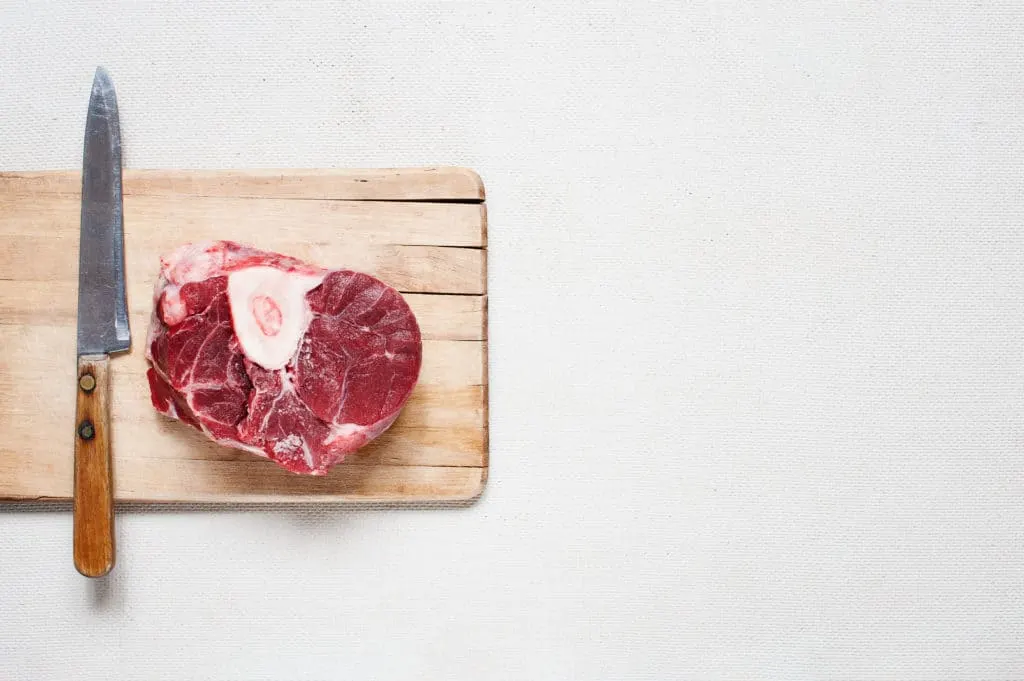
As much as you may want to feed your German Shepherd the raw meat that he is so desperately wanting, you care too much about his health to just do so without knowing if it is safe.
Can you feed a German Sheperd raw meat? It is safe to feed a dog raw meat as long as it is fresh and has been thoroughly washed. A dog’s gastrointestinal system is evolved to eat raw meat. This allows them to safely consume it and remain unaffected by the bacteria contained in it.
Picture yourself standing in your kitchen preparing meat to cook, you feel a presence, and when you turn to look you notice your German Shepherd staring intently into your eyes – then at the meat, then back into your eyes. Sound familiar? Your dog doesn’t care if the meat is raw or cooked, he just wants some. Though if given the choice, he would prefer take it as is, no need for cooking.
But before you feed your German Shepherd raw meat, please make sure that you are following proper precautions. In this article, we will take a closer look at the benefits and potential hazards of feeding raw meat to your dog, as well as explore an alternative.
Your German Shepherd’s Gastrointestinal System
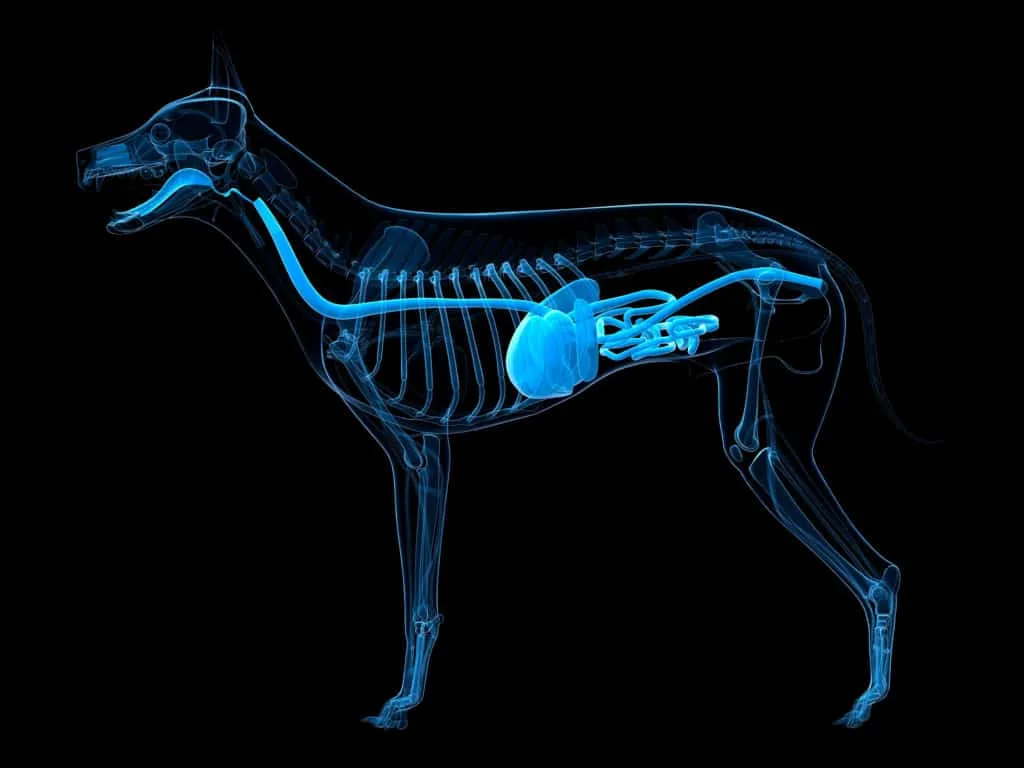
A lot of today’s German Shepherds’ behaviors, tendencies, and preferences were actually imprinted in the breed a long time ago. Not by the way that they have been bred, but instead through their ancestry.
German Shepherds are descendants of wolves, and a wolve’s diet consists exclusively of raw meat. It’s all they eat from the day that they are born, and their gastrointestinal systems (GI) are set up to do so without causing any health issues to the animal.
In fact, the GI system of a wolf is so resilient that when fresh meat is scarce, a wolf can scavenge and consume aging and rotting meet as well and it will do them no harm.
A wolf can do this because compared to a human, its GI system is shorter in length, and this allows food to pass through it quickly and efficiently. If consumed food lingers in a GI system, then bacteria and viruses have a chance to “set up shop,” so to speak, and this is how illness occurs.
Wolves also have very strong stomach acids which allows them to quickly break down food that a human could never even consider eating. These strong stomach acids, working in tandem with a short GI system, allows a wolf to consume just about anything that it pleases without the risk of illness. This is essential for a wolf living in the wild, because sickness can often mean certain death.
Having descended from wolves, German Shepherds’ GI systems are set up in the same way. A short GI system and strong stomach acids allow a GSD to consume raw meat without any risk of serious illness.
Think of a stray dog on the street. Unless it happens to live in a highly touristed area and is spoiled by visitors feeding it quality table scraps, it’s highly unlikely that you will come across a stray that is a picky eater. They consume just about anything that they can, and yet somehow their health remains unaffected. This is no accident, it’s just as nature intended.
Is All Raw Meat Safe for Dogs?
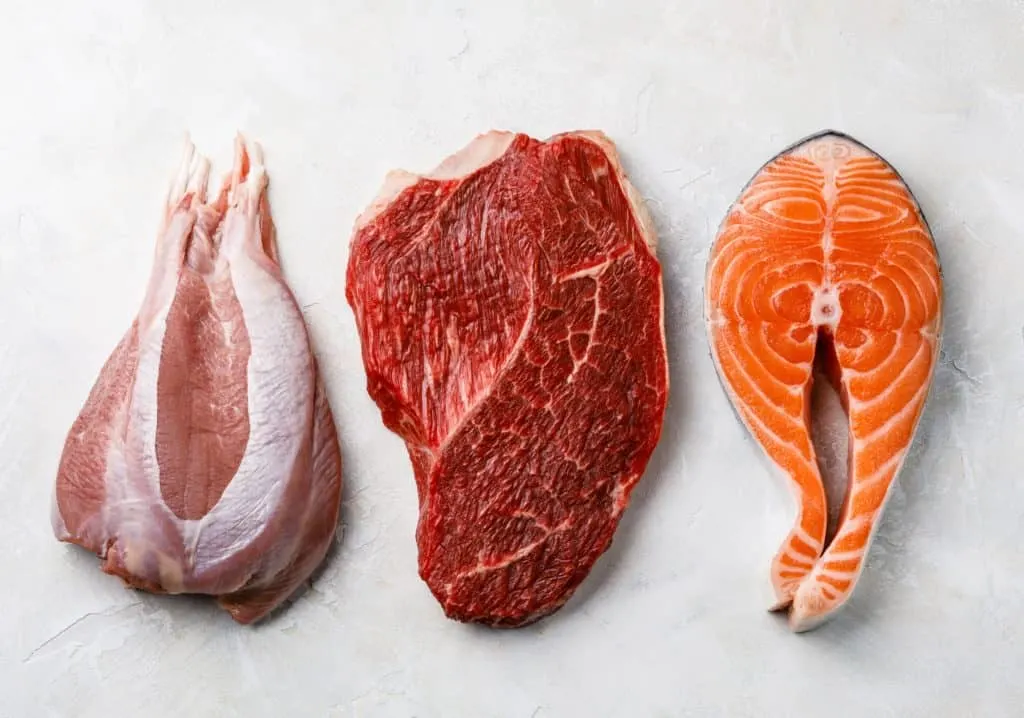
For the most part, all raw meat is safe for a German Shepherd. This caution of “for the most part” is to make you aware that you should never feed your dog raw meat that you wouldn’t cook and eat for yourself.
This means that you should always follow the same guidelines that you would use for yourself and your family when choosing meat to serve to your GSD. Make sure that you check the expiration date, and do not pick meat to serve to your dog if the date has passed.
What Are the Benefits of Feeding a German Shepherd Raw Meat?
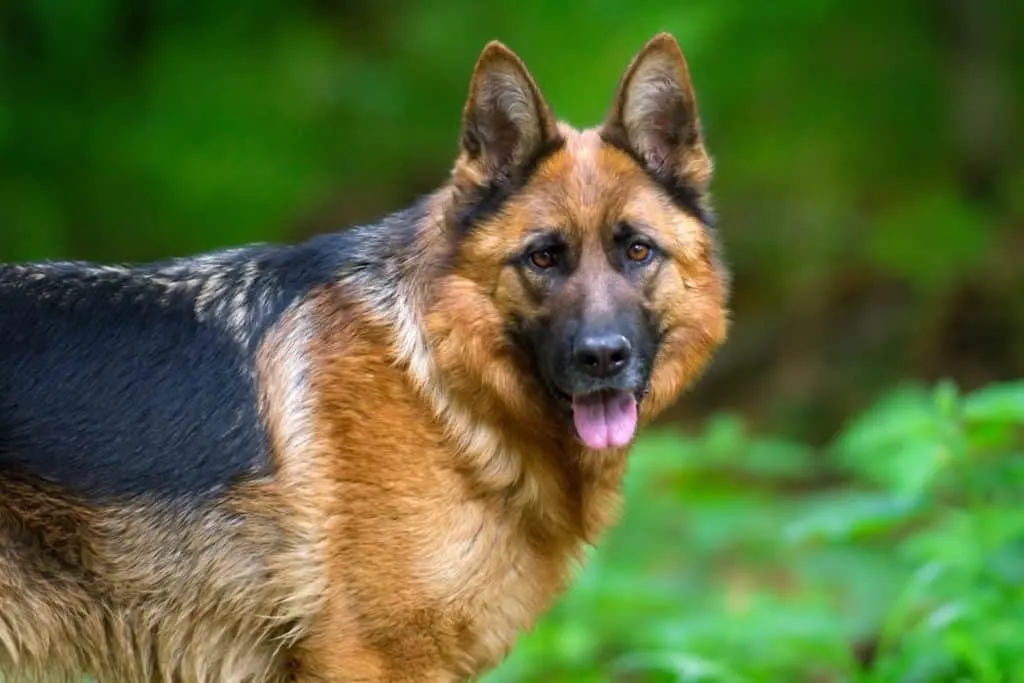
As long as proper precautions are followed, then feeding your GSD raw meat can benefit your dog in a number of ways.
- Improved digestion
- Cleaner teeth
- Fresh breath
- Shiny and healthy skin and coat
- Better mobility for older dogs
- Increased energy and stamina
- Improved bowel health
- Improved liver health
- Improved immune system
- Less allergies
- Smaller and less smelly stools
- Less occurrences of obesity
What Are the Dangers of Feeding a German Shepherd Raw Meat?
Salmonella
Salmonella does not affect dogs in the same way that it affects people. A large percentage of healthy dogs will test positive for salmonella in their systems regardless of the food that they eat. It is a normal part of their GI flora and so they naturally excrete it in their feces and saliva.
The majority of human salmonella cases come from ingestion and handling of dry foods and treats, and not from handling uncooked meats as popularly thought.
So the real salmonella threat is to you, and not to your dog. And regardless of the food that you feed your dog, there is a good chance that it is already carrying salmonella. The people most affected by this are those who have compromised immune systems.
So just remember to handle any raw meat that you prepare for your dog in the same manner that you would handle raw meat that you feed to your family. In addition to properly rinsing raw meat, be sure to disinfect counters, bowls, and any other surfaces that the raw meat may come into contact with. This also applies to your dog’s food bowl – make sure to thoroughly wash and disinfect it after feeding your dog raw meat from it.
Also, according to the FDA, you should wash your hands for at least 20 seconds with soap and warm water after handling any raw meat and also the same before eating.
Trichinosis
This is a parasitic disease that is most often caused by eating undercooked pig or wild game infected with larval trichinella (a parasitic worm).
These larvae may, however, be killed off by heating, freezing, or irradiating the meat. While you can of course heat or freeze meat at home, irradiation is carried out in government facilities with x-rays, gamma rays, and electron beams.
To effectively kill off trichinella by freezing, you must freeze raw pork meat for 3 weeks before you feed it to your dog.
Toxoplasmosis
This is caused by the protozoa called toxoplasma gondii. It’s a parasite that can affect virtually all mammals, and is actually found living in up to 65% of people worldwide, and may affect over 40 million people in the United States alone.
Though the vast majority of people infected with Toxoplasmosis will never show any symptoms if they have healthy immune systems. People most at risk are pregnant women and those with compromised immune systems.
Infection from these protozoa can happen when raw meat is consumed, most often venison, pork, lamb, oysters, clams, and mussels. Infection can also occur from infected feces. Infection can also accidentally occur when not washing hands after gardening or eating unwashed fruits and vegetables from a garden.
and vegetables from a garden.
The risk of Toxoplasmosis can be avoided by freezing raw meat for 24 hours and again remembering to thoroughly disinfect all surfaces that raw meat may have come into contact with.
Salmon Poisoning
This can occur when feeding a dog salmon or any other anadromous fish (fish that swim upstream to spawn), and it works like this:
The fish harbors a parasite (Nanophyetus salmincola), and in turn, this parasite harbors an organism (Neorickettsia helminthoeca). The parasite is relatively harmless, but it is the organism that it carries which causes salmon poisoning and produces its harmful effects.
And again here, freezing the raw fish meat will inactivate both the parasite and the organism. However, this requires some attention to detail to do properly. To effectively kill these off, salmon must be deep-frozen for at least 7 days.
GI Parasites
These parasites, which include tapeworms, roundworms, coccidia, and hookworms are often a concern for some people who want to feed their dog raw meat. These organisms are found within the GI tract of animals, or to put it another way, the “guts” of an animal.
So just make sure that you are not feeding your dog the GI tract of any animal, and this will ensure that he will not acquire any GI parasites. As long as you are feeding your dog USDA inspected meat, there is no risk of contraction. Also make sure that if your dog kills an animal on its own, as German Shepherds sometimes do, that you do not allow it to eat that animal, as it will also be consuming the animal’s GI tract.
Food Poisoning
Dogs can get food poisoning from eating rancid meat. Spoiled, rancid meat contains endotoxins that will kill just about anything that eats it (except scavengers that are built to do this).
This also happens in the wild, but that’s how nature wanted it, as it is a means of population control.
Of course we don’t want any such thing to happen to our lovely companions, so just be extra cautious when checking expiration dates on meat, and do the smell test. If it smells off, it likely is off. Don’t take any chances.
Alternative to Store-Bought Raw Meat
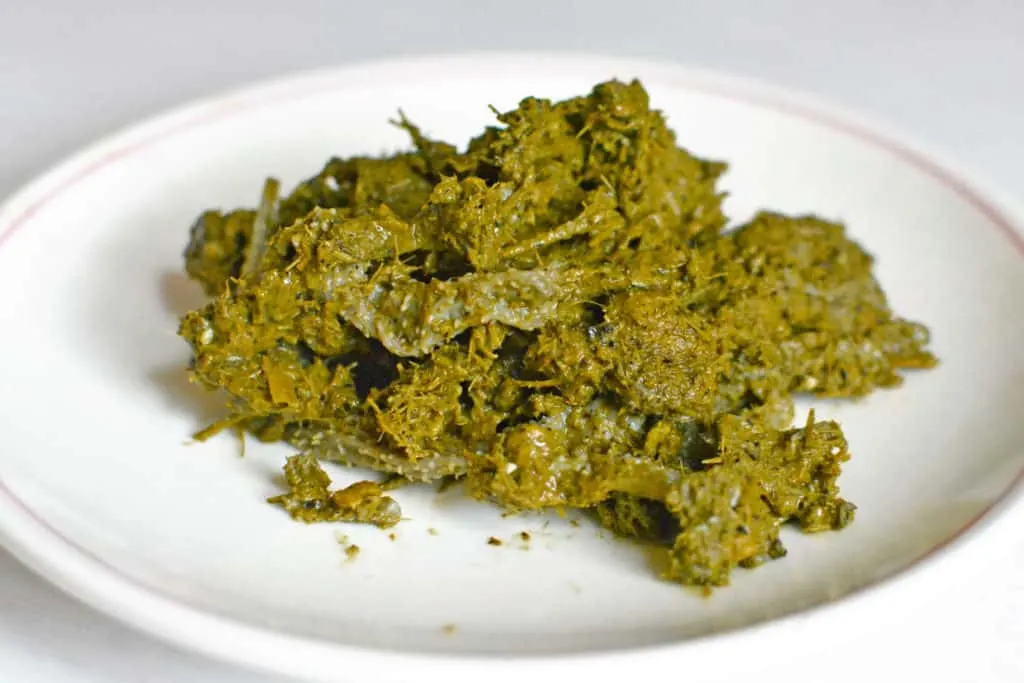
It’s important to understand pet food has only been around for about 100 years. On the other hand, wolves have been eating raw meat for millions of years.
Even though dogs have evolved through the years to become tolerant of starches – corn, wheat, rice, potato, and other products in traditional dog food, their systems have not evolved to do so. There is a big difference between adaptation and evolution. Unlike evolution, adaptation is not a natural process, but instead a forced one.
A reasonable alternative to raw meat is commercially manufactured raw dog food. You can feel safe that if you feed your dog raw dog food from a reputable manufacturer that it will not be exposed to the bacteria and parasites discussed above.
Manufacturers of raw dog food use several different methods to ensure this:
- High-Pressure Pasteurization (HPP): In this process, meat products are exposed to extremely high pressures. This pressurization inactivates or kills off microbial bacteria which makes the food sterile.
- Batch testing: Companies that do not want to use pasteurization use this method to test for the presence of harmful bacteria. This is the same method that the USDA uses to inspect the meat that is sold for human consumption.
When a company batch tests its food, it’s using meat already inspected by the USDA for human consumption, then again for dog consumption. So this means that the meat is tested twice, which is a step above the standards that the USDA uses for humans! - Inspecting the health of the herd that the animal came from: Research has shown that well cared for, stress and drug-free livestock shed significantly less harmful bacteria including E. Coli and Salmonella than feedlot cattle, which are often raised in stressful, inhuman conditions. The companies that rely on this method only purchase cattle from farmers who raise their cattle in an ethical, very health-conscious manner.
Precautions when introducing your German Shepherd to commercially produced raw food
Not all raw commercially available raw dog foods are properly nutritionally balanced. Because of this many dogs develop nutritional imbalances that can be avoided by purchasing a properly balanced food. A food must have a proper balance of:
- Antioxidants
- Trace Minerals
- Vitamins
- Fatty Acids
The key takeaway here is to not wait until your German Shepherd develops a nutritional imbalance before you realize the importance of giving him the proper food in the first place.
Also, if you do choose to begin feeding your dog commercially produced raw food, make sure that you don’t make the switch suddenly without giving your dog a chance to get used to it.
Making this shift too quickly can cause GI problems like diarrhea. Also be aware that you should never mix dry kibble and raw dog food together. This is because the two food sources are metabolized differrently by a dog since raw foods are mostly protein and dry kibble is mostly starch. If the two are mixed, then a dog’s GI system gets confused and this can also cause diarrhea.
So as a precaution, begin introducing your dog to raw food as a treat and watch the dog’s stool. If all is fine, then increase the frequency of the raw food treats for a few days, and then go for an entire meal replacement. Repeat this process for a few days, and if all remains well then you are safe to switch over entirely from dry kibble to raw dog food.
Final Thoughts
Feeding your dog raw meat is great for your dog both from a nutritional standpoint as from a mental health point of view. Happy dogs are healthy dogs, and few things make a dog happier than eating raw meat!
Just be sure that you take the proper precautions when preparing raw meat for your dog, and just use common sense. Never feed your dog anything that you wouldn’t prepare for yourself or your family.
